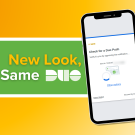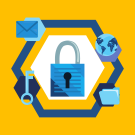
Fall 2023: Technology News & Updates
Articles, resources & tech tips for a successful school year
Cybersecurity | Tech Help & Resources | Actions for Faculty & Staff | Actions for Students | Tech News Highlights | Upcoming Events

Protect Your Information & Identity from Cybersecurity Threats: Phishing & Other Fraudulent Activities
Email is the most common vector for cyber security attacks in higher education. The average cost of a data breach in 2022 was $4.35 million and the cost only increased when fraudulent emails (or phishing attempts) were the initial attack vector.
Most often motivated by financial gain, hackers frequently employ social engineering techniques to gain unauthorized access to data and accounts via email (“phishing”), text messaging (“smishing”), phone (“vishing”), or online services such as social networking. Click here to learn how to spot a scam.
To avoid becoming a victim:
-
Never provide personal information in response to an unsolicited email, phone, text message, or letter, even if it appears to be from a friend or colleague.
-
If unsure, contact the purported senders using information from their official website, as opposed to information provided in the unsolicited communication.
-
Check the Authentic Message Registry to confirm official UC Davis communications.
If you receive a suspected phishing email, please report it by using the Report Message > Phishing option in Outlook or the Report Phishing button in Google.
Tech Help & Resources
- Find IT services & get answers. The Service Hub is your 24/7 one-stop location for services, software, and tech support at UC Davis. Log in to unlock access to department-specific content. Click here to visit the Service Hub.
- Get direct support for UC Davis technology services via email, chat or phone from your department IT support or IT Express. IT Express, UC Davis’s central IT service desk, can be reached at (530) 754-HELP (4357) (Monday through Friday, from 7 a.m. to 6 p.m., PST). For 24/7 support, use Botrock, our virtual agent, to get answers, start a support ticket, or track your requests. If you are associated UC Davis Health, contact the Technology Operations Center, UCDH IT.
- Check the status of IT services.
-
Learn more about computing access on campus:
- Computer Labs/Computer Classrooms are located in several buildings across campus and are each equipped with printers.
- IET Media Lab provides access to media equipment and software for students to create their own projects using scanner, video, audio, and general computer stations.
- IET Virtual Lab is a remote connection that allows students to work on assignments using specialized software when the computer rooms are closed.
- Student Disability Center provides loans for assistive technology to students to enhance academic access.
- Financial Aid offers eligible undergraduate and graduate FAFSA filers loans for a computer purchase.
-
Actions for Faculty & Staff
-
1. Get (re)acquainted with instructional tech.
a. Use lecture capture to record your course content live in select classrooms or from your computing device.
b. Explore computer rooms across campus or the IET virtual lab for remote connections to computer labs.
c. For questions about technology in general assignment classrooms, contact the Classroom Hotline.
d. Learn more about creating an inclusive classroom.
e. Schedule a consultation with an instructional designer. To get started, email instructionaldesign@ucdavis.edu. For Canvas questions, email canvashelp@ucdavis.edu.
2. Stay informed with WarnMe alerts, aggiefeed, and UC Davis Mobile.
a. Sign up for WarnMe alerts (or review your information). UC Davis sends WarnMe and Aggie Alert messages by text, email and the Everbridge Mobile App to provide faculty, staff and students with timely information during emergencies and other urgent situations.
b. Aggiefeed, a campus-based Twitter-like service that aggregates information from across campus into a single stream of real-time posts, such as news and announcements, events, WarnMe university alerts, and announcements from the campus Learning Management System.
c. All of UC Davis, one app, in iOS or Android. UC Davis Mobile allows you to do everything from checking aggiefeed to accessing your UC Davis email.
3. Refresh your computing environment & get ready to present.
a. Install updates for apps you often use (e.g., Zoom). Launch apps to ensure the latest updates are installed.
b. Check your Duo settings and manage your devices, especially if you are traveling.
c. Log in to Microsoft 365, Google Workspace for Education, and if applicable, UC Davis Canvas to ensure you can easily access your files.
d. If applicable, make sure you have any adapters you may need to connect your computer to your classroom or meeting room audio/video systems.
Find additional resources in our Technology Guide for New Staff and Faculty in the Service Hub. -
Actions for Students
1. Stay informed with WarnMe alerts, aggiefeed, and UC Davis Mobile.
a. Sign up for WarnMe alerts (or review your information). UC Davis sends WarnMe and Aggie Alert messages by text, email, and the Everbridge Mobile App to provide faculty, staff, and students with timely information during emergencies and other urgent situations.
b. Aggiefeed, a campus-based Twitter-like service that aggregates information from across campus into a single stream of real-time posts, such as news and announcements, events, WarnMe university alerts, and announcements from the campus Learning Management System.
c. UC Davis Mobile allows you to do everything from checking aggiefeed to accessing your UC Davis email—all of UC Davis in one app.
2. Get your computer devices ready for the new academic year.
a. Set up eduroam on any new devices.
b. Check your Duo settings and manage your devices, especially if you are traveling.
c. Install updates for apps you often use (e.g., Zoom). Launch apps to ensure the latest versions are installed.
d. Log in to Microsoft 365, Google Workspace for Education, and if applicable, UC Davis Canvas to ensure you can easily access your courses and assignments.
3. Get the right computer & get access to free & discounted software.
a. Review recommended computer configurations. For additional information, see Computer Ownership Guidelines for Students. Consult your department about specific software or hardware requirements that differ from the recommended computer configurations. If you require a new computer or accessories, the UCD TechHub is available to assist with your purchase and delivery.
b. Free and discounted software options are available to students, including Microsoft Office, Adobe Creative Suite, and more. For Microsoft software, see How can I download Microsoft Office 365 and other Microsoft applications to my computer? All students are entitled to a fully licensed Zoom account. See the Zoom Guide for Students to get started.
Find additional resources in our Technology Guide for New Students in the Service Hub.
Tech News Highlights

Lived Names Now Available in More UC Davis Online Spaces
Starting the week of September 25, 2023, more UC Davis digital spaces, including email, UC Davis Canvas, online advising systems, photo rosters, online storage and collaboration services, and others will feature students’ lived names. A lived name reflects a person’s chosen identity and may differ from their legal name. Click here to read more about the Gender Recognition & Lived Name initiative.

Duo Login Changes Announced for Fall 2023
Duo, UC Davis’s multi-factor authentication app, which members of the campus community use to access email, online storage, and other campus services, will introduce a new login experience starting November 1, 2023. The new user experience is designed to work faster and strengthen security. No action is required on your part to trigger this change. Click here for more information, including a video highlighting these changes.

Sensitive Data and Artificial Intelligence (AI): Guidance from UC Davis Technology Leadership
UC Davis recommends that faculty and staff not use AI technologies with sensitive UC Davis systems and data. More information is forthcoming as usage guidelines are developed in partnership with campus and UC system stakeholders, including the Academic Senate. Click here to read the August 2023 Guidance Memo.

Cybersecurity Awareness Month - October 2023
Learn more about how you can protect your identity, personal information, and institutional data from Information and Educational Technology (IET) during Cybersecurity Awareness Month this October.
Cybersecurity Awareness Month is a collaboration between the government and private industry to raise awareness about digital security and empower everyone to protect personal and institutional data from digital crimes.
At UC Davis this year, we are raising awareness about four impactful topics for our campus community: personal cybersecurity, data classification, multi-factor authentication, and information security policies.
